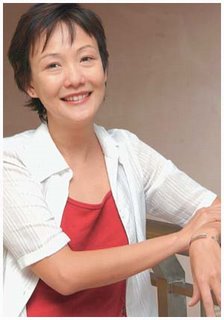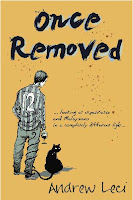GUEST BLOGGER Janet TAYTHE ART OF WRITING AND THINKING
 THE MPH Breakfast Club for LitBloggers
THE MPH Breakfast Club for LitBloggers was on a Sunday this month, not its usual Saturday, and we had two very interesting speakers, Sydney-based Malaysian writer
Beth Yahp, the author of
The Crocodile Fury (Angus & Robertson/HarperCollins Australia, 1992), and former flight stewardess
Yvonne Lee, the bestselling author of
The Sky is Crazy: Tales from a Trolley Dolly (Marshall Cavendish, 2005). I would say that both speakers were pretty much from different ends of the spectrum and both had much wisdom to impart on writing and literature.
 Reading Lolita in TehranBeth
Reading Lolita in TehranBeth started first, and besides raving about
Azar Nafisi’s book,
Reading Lolita in Tehran: A Memoir in Books (2003), also brought up issues on, among other things, morality and the author. (
Nafisi’s memoir is an account of a weekly study of banned Western literature in her home organised with seven of her female students, after she resigned as professor from a leading university in Tehran.) I found this very interesting because it’s an issue that I constantly grapple with when I write. I think that generally most people do think of themselves as inherently “good” and uphold a certain standard of what they deem as “acceptable moral values,” which differs according to your culture, upbringing and, more often than not, religious beliefs.

For the rest of us
tiada’s (that’s what it says on your identity card if you do not “possess” a religion), moral values can vary greatly but there are certain basics that you can count on—although not necessarily without a tonne of qualifiers that come with them—such as don’t kill people (without a really good reason), don’t steal (unless your baby’s dying from starvation or if you absolutely just have to have that Prada bag for tonight’s company do), don’t assault people in the queue to pay for their parking tickets at KLCC autopay machines (even if they insist on not looking at the pictorial guide by the side of the slot where they’re supposed to stick money bills in on the left, on the left, dammit! Like this!) no matter how tempting it is. But what about other grey areas, such as, is it okay to kill ants or cheat on your blood test?
 Lolita
LolitaLeaving those intensely philosophical questions aside, I’ve always thought that writers should keep an open mind. It’s not up to you to make a definite statement on whether you think something is right or wrong. If that’s what you want to do as a writer, then go volunteer yourself to some political parties to write slogans for posters.
Beth alluded to the example of herself having hated
Humbert Humbert in
Vladimir Nabokov’s
Lolita (1955) so much in the past that she never finished reading the book (and instead threw it across the room) and to this day has never revisited the modern classic.
Beth’s reading of
Hafisi’s account of her and her students’ love of
Lolita however has prompted her to think about whether she should pick up that book again (presumably from across the room where she left it ages ago).
Being non-judgmentalHow many of us can say we’re not judgmental? I’m sure I’m biased when I say this, but because I am Malaysian and I do live in Malaysia, I feel most entitled to say this: Malaysians are one of the most judgmental bunch of people I’ve seen and heard in my life. No one seems to think twice before sashaying around, pointing fingers at other people whom they regard as being morally bankrupt, making disparaging remarks about how people should be this and that, and then rest in the comfort of knowing (erroneously) that their truth is supreme, unchallengeable.
Keeping an open mindIf we are to cultivate and nurture a new generation of writers who have the propensity to produce literature (novels, short stories, poetry) that would amount to any kind of quality, I think this is a very salient point to address indeed.
Keep that mind open. It sounds simple enough but virtually an impossible task for the quintessentially judgmental Malaysian. A good writer needs to possess chameleon-like abilities, to be able to transform and breathe life into a particular character in his novel, so that the fluidity of his thoughts can shape and sculpt his work of art into something which gives meaning to, and ideally changes and improves, the lives of those who read it.
Shades of greyTo put it very simply, the world is not—and has never been—black or white. Writers must avail themselves of a certain greyness which would enable them to grow so that they may see things from a many-angled view. It’s not hard to deduce that such multifaceted perspectives would likely result in a piece of work that is not only worthy to be called Malaysian and unique, but more importantly something that touches the hearts of people on a universal plane. For values, at the end of the day, discounting and recounting culture, religion and creed, are universal and we need to see that clearly.
 How do writers do it
How do writers do itAt the other end of the spectrum and on the lighter side,
Yvonne shared with us her passion for writing and her earnest efforts at finding the time to write, being a mother of two with a full-time job as a piano teacher. It always amazes me that women with kids and a full-time job can actually find the time to write! Kudos to women all around the world who can do so. I think there really aren’t enough stories or accounts being given on the sacrifices that these women have to make and the kind of energy and drive they possess in order to achieve their dreams.
Yvonne talked about how she has to write in a very specific environment: her backroom with no air conditioning, no sound or noise at all in the background and (not sure if this is always a prerequisite) that she would also be wearing shorts and a singlet. I thought it was interesting that she brought up this issue as it’s always something that readers and especially writers themselves contemplate and are curious about—how do writers (or other writers) write? Is there a trick to it? What’s the magic, the secret? Some people read writing books and autobiographies of writers to see what makes them tick, but the truth is, there really isn’t one single way to do it. You have to find your own “trick”; what works for one writer may not work for the other.
Yvonne asked
Beth whether she needed a specific place to write but
Beth said that she could write in cafés, to which
Yvonne replied she could never do because of the noise.
Yvonne has her own quirks, she said—the same situation in which she writes must be replicated every time. It isn’t uncommon what she suggested. Many journalists have trained themselves to work in a haze of cigarette smoke, the loud chatter and the clickety-clack of typewriters (history, of course), presumably in a kind of zen-like state of being, blocking out all irrelevant noise and thoughts.
ConclusionAll in all, it was a very productive and lively session. There’s nothing like a forum where people are free to air their views on literature and other elements that we sometimes forget are also infused in books: culture, history, society. Writing, at the end of the day, is all about us, our lives and how we live them. I hope that the audience went away with much food for thought because I certainly did.
Janet TAY is a book editor in Kuala Lumpur, Malaysia
 AMY BLOOM is the author of the novel, Love Invents Us (1997), as well as two collections of stories, Come to Me (1993) and A Blind Man Can See How Much I Love You (2000), all focusing on the “bittersweet solace of love in its myriad permutations.” Her new novel, Away (Random House, 2007), the sweeping story of an émigré mother who can’t and won’t forget her long-lost daughter and who then embarks on a gruelling journey across America and deep into Alaska, the Yukon and Siberia in search of her. Set in Russia and America in the 1920s, this could possibly be one of the books of 2007.
AMY BLOOM is the author of the novel, Love Invents Us (1997), as well as two collections of stories, Come to Me (1993) and A Blind Man Can See How Much I Love You (2000), all focusing on the “bittersweet solace of love in its myriad permutations.” Her new novel, Away (Random House, 2007), the sweeping story of an émigré mother who can’t and won’t forget her long-lost daughter and who then embarks on a gruelling journey across America and deep into Alaska, the Yukon and Siberia in search of her. Set in Russia and America in the 1920s, this could possibly be one of the books of 2007.


















































